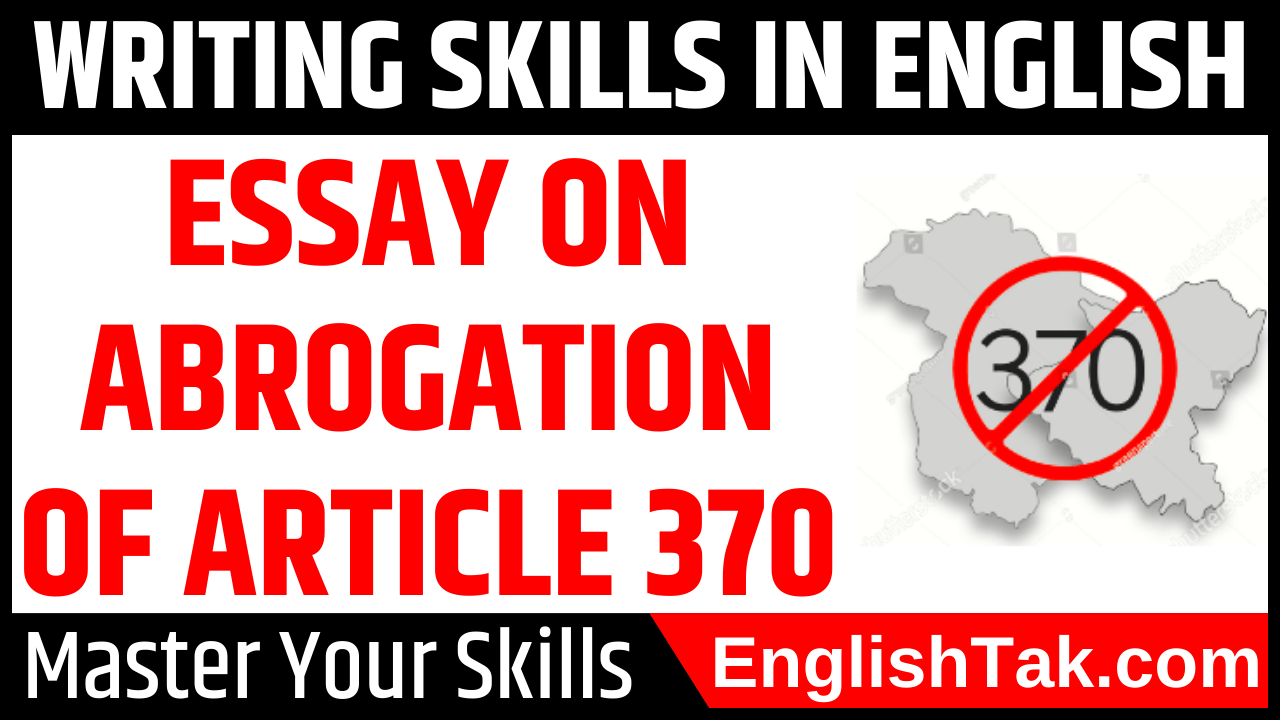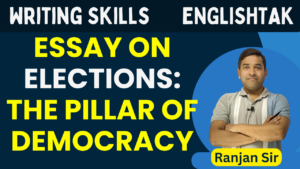![]()
Abrogation of Article 370 Essay in English
Table of Contents
Abrogation of Article 370 Essay in English – In this Post, I am sharing an Essay on Abrogation of Article 370 from Kashmir. Essay on Abrogation of Article 370 in English and Hindi.
Article 370 was included in the Constitution of India on October 17, 1949 and exempted Jammu & Kashmir from the Indian Constitution (except Article 1 and Article 370 itself). It further allowed J&K to draft its own Constitution and restricted Parliament’s legislative powers in respect of J&K. Consultation of the state government was a requisite for extending central law on subjects included in the Instrument of Accession (IoA). However, the concurrence of the state government was mandatory for extending it to other matters. With the Indian Independence Act, 1947 the British India got divided into India and Pakistan and at the same time the IoA came into existence.
17 अक्टूबर, 1949 को अनुच्छेद 370 को भारत के संविधान में शामिल किया गया और जम्मू-कश्मीर को भारतीय संविधान से मुक्त कर दिया गया (अनुच्छेद 1 और अनुच्छेद 370 को छोड़कर)। इसने जम्मू-कश्मीर को अपना संविधान तैयार करने की अनुमति दी और जम्मू-कश्मीर के संबंध में संसद की विधायी शक्तियों को प्रतिबंधित कर दिया। विलय पत्र (आईओए) में शामिल विषयों पर केंद्रीय कानून का विस्तार करने के लिए राज्य सरकार का परामर्श आवश्यक था। हालाँकि, इसे अन्य मामलों में विस्तारित करने के लिए राज्य सरकार की सहमति अनिवार्य थी। भारतीय स्वतंत्रता अधिनियम, 1947 के साथ ब्रिटिश भारत भारत और पाकिस्तान में विभाजित हो गया और उसी समय IoA अस्तित्व में आया।
The Act provided to the nearly 600 princely states three options: to remain an independent country, join Dominion of India or join Dominion of Pakistan – and this joining with either of the two countries was to be through an IoA. The state willing to join was given the choice of specifying the terms on which it agreed to join. Article 370 itself mentions Article 1, which includes J&K in the list of states and has been described as a tunnel through which the Constitution is applied to J&K. Article 3 of the J&K Constitution declares J&K to be an integral part of India.
अधिनियम ने लगभग 600 रियासतों को तीन विकल्प प्रदान किए: एक स्वतंत्र देश बने रहना, भारत के डोमिनियन में शामिल होना या पाकिस्तान के डोमिनियन में शामिल होना – और दोनों देशों में से किसी एक के साथ यह जुड़ाव IoA के माध्यम से होना था। शामिल होने के इच्छुक राज्य को उन शर्तों को निर्दिष्ट करने का विकल्प दिया गया था जिन पर वह शामिल होने के लिए सहमत हुआ था। अनुच्छेद 370 में स्वयं अनुच्छेद 1 का उल्लेख है, जिसमें जम्मू-कश्मीर को राज्यों की सूची में शामिल किया गया है और इसे एक सुरंग के रूप में वर्णित किया गया है जिसके माध्यम से संविधान जम्मू-कश्मीर पर लागू होता है। जम्मू-कश्मीर संविधान का अनुच्छेद 3 जम्मू-कश्मीर को भारत का अभिन्न अंग घोषित करता है।
Abrogation of Article 370 Essay in English
Recent Developments Around Article 370
The contentious Article 370, which provided a special status to J&K, has been revoked recently on August 5 by the present Modi government. J&K has further been divided into two UTs – J&K and Ladakh. This far-reaching decision seeks to redraw the map and future of a region at the centre of protracted militancy. The two UTs would come to existence on October 31.
जम्मू-कश्मीर को विशेष दर्जा प्रदान करने वाले विवादास्पद अनुच्छेद 370 को वर्तमान मोदी सरकार ने हाल ही में 5 अगस्त को रद्द कर दिया है। जम्मू-कश्मीर को दो केंद्रशासित प्रदेशों – जम्मू-कश्मीर और लद्दाख में विभाजित किया गया है। यह दूरगामी निर्णय लंबे समय से चले आ रहे उग्रवाद के केंद्र में एक क्षेत्र के मानचित्र और भविष्य को फिर से चित्रित करने का प्रयास करता है। दोनों केंद्रशासित प्रदेश 31 अक्टूबर को अस्तित्व में आएंगे।
The President Ram Nath Kovind in his Independence Day speech expressed his confidence about the immense benefits that the new law and bifurcation of the state of J&K would bring. The changes made in J&K and Ladakh would enable the people to access and enjoy the same rights, privileges and facilities as their fellow citizens in the rest of the country.
राष्ट्रपति राम नाथ कोविंद ने अपने स्वतंत्रता दिवस के भाषण में नए कानून और जम्मू-कश्मीर राज्य के विभाजन से होने वाले अपार लाभों के बारे में विश्वास व्यक्त किया। जम्मू-कश्मीर और लद्दाख में किए गए बदलाव लोगों को देश के बाकी हिस्सों में अपने साथी नागरिकों के समान अधिकारों, विशेषाधिकारों और सुविधाओं तक पहुंचने और उनका आनंद लेने में सक्षम बनाएंगे।
Besides progressive, egalitarian laws and provisions related to the Right to Education, people of the region would also be able to access public information through the Right to Information. The traditionally deprived communities will have access to reservations in education and employment and other facilities. The abolition of unequal practices such as instant triple talaq would serve justice to the Muslim women of the region.
शिक्षा के अधिकार से संबंधित प्रगतिशील, समतावादी कानूनों और प्रावधानों के अलावा, क्षेत्र के लोग सूचना के अधिकार के माध्यम से भी सार्वजनिक जानकारी प्राप्त कर सकेंगे। परंपरागत रूप से वंचित समुदायों को शिक्षा और रोजगार और अन्य सुविधाओं में आरक्षण तक पहुंच प्राप्त होगी। तत्काल तीन तलाक जैसी असमान प्रथाओं के उन्मूलन से क्षेत्र की मुस्लिम महिलाओं को न्याय मिलेगा।
Abrogation of Article 370 Essay in English
Key Notes from the Prime Minister’s Address Post Revocation of Article 370
• Besides helping in the development of the youth in the region, this act will usher in a new dawn there.
• Jammu & Kashmir will witness assembly elections from now onwards and people there will have a Chief Minister, MLAs and ministers who will represent them and people will also be choosing their representatives.
• After 1947, many people who came to India couldn’t contest polls in Jammu & Kashmir as they had rights everywhere, except in Jammu & Kashmir. Now with the scrapping of Article 370, the rights of such migrated people will be restored.
• More so, the valley suffered from terrorism and violence where Articles 35A and 370 were often used as tools to spread the same.
• When laws were made for the entire country, J&K was always exempted from the benefits of such progressive laws.
• All J&K workers will be benefitted under the employment schemes provided by the government.
• The decision of creating two UTs namely Jammu and Kashmir and Ladakh was taken by the government after constructive discussions and weighed options. The region will witness the opening of IITs and IIMs and after the normalization of condition in the region, the status of “Statehood” will be brought back in Jammu and Kashmir.
• The state can become the biggest tourist destination as the government is working on providing a peaceful environment for tourists and the creative bodies (film & theatre) to engage with the state.
• Sports will get a boost and sporting talents will be provided with the much needed infrastructure to excel.
• Many endemic plants grown in Jammu & Kashmir can be used for their medicinal properties.
• Ladakh can become a solar power house and play a crucial role in International Solar Alliance. Without any sort of discrimination, there will be development in the UT.
• The separatists and their separatists’ tendencies will now be given befitting reply by the people.
• People in the valley region will celebrate festivities without any hurdles.
• The dreams of accelerated development, effective and transparent governance and yet a smaller footprint of government in people’s everyday life would now be realized with ease.
Abrogation of Article 370 Essay in English
Key Changes:
• The ending of the special status of J&K in the Indian Union will now let the government extend all provisions of the Constitution to the State in one go. Besides this, it will also allow all citizens to buy property and vote in the State.
• All Central laws, instruments and treaties will now be extended to Kashmir. The drastically altered Article 370 will however stay on the statute books.
• The Union Territory of J&K will have a legislature, but Ladakh will not have the same.
• The Bill proposes wide powers to the Lieutenant Governor of the proposed Union Territory of J&K and makes it the “duty” of the Chief Minister of the Union Territory to “communicate” all administrative decisions and proposals of legislation with the LG.
• The new Union Territories of J&K and Ladakh will see the application of all the Central laws and State laws.
• Assets and liabilities of J&K and Ladakh would be shared on the recommendations of a Central Committee within a year.
• Until all the allocations of employees of State public sector undertakings and autonomous bodies are determined, they will continue in their posts for another year.
• The police and public order is to be with the Centre.
• The notification amends the expression “Constituent Assembly”, contained in the proviso to clause (3) of Article 370, to mean “Legislative Assembly”.
Impact:
The tabling of the proposed Reorganization Bill indicates the end of the long reign of the 1954 order that had introduced a proviso to Article 3 that states that “no Bill providing for increasing or diminishing the area of the State of J&K or altering the name of that State shall be introduced in Parliament without the consent of the Legislature of that State”. That power of the State Legislature to give prior consent does not exist anymore.
प्रस्तावित पुनर्गठन विधेयक को पेश करना 1954 के उस आदेश के लंबे शासन के अंत का संकेत देता है जिसने अनुच्छेद 3 में एक प्रावधान पेश किया था जिसमें कहा गया था कि “कोई भी विधेयक जम्मू-कश्मीर राज्य के क्षेत्र को बढ़ाने या घटाने या उसके नाम में बदलाव करने का प्रावधान नहीं करता है।” राज्य को उस राज्य के विधानमंडल की सहमति के बिना संसद में पेश किया जाएगा।” पूर्व सहमति देने की राज्य विधानमंडल की वह शक्ति अब मौजूद नहीं है।
With this, the Parliamentary laws including that of reservation, would apply to J&K as it does in other parts of the country. It further mandates that no proclamation of Emergency on grounds “only of internal disturbance or imminent danger shall have effect” in the State unless with the concurrence of the State government.
इसके साथ, आरक्षण सहित संसदीय कानून जम्मू-कश्मीर पर भी लागू होंगे जैसा कि देश के अन्य हिस्सों में होता है। इसमें यह भी आदेश दिया गया है कि राज्य में “केवल आंतरिक गड़बड़ी या आसन्न खतरे के आधार पर आपातकाल की कोई भी घोषणा लागू नहीं होगी” जब तक कि राज्य सरकार की सहमति न हो।
This has been called by the government as the end of “positive discrimination” and the closing of the ‘gap’ between residents of J&K and citizens of other parts of the country.
सरकार ने इसे “सकारात्मक भेदभाव” की समाप्ति और जम्मू-कश्मीर के निवासियों और देश के अन्य हिस्सों के नागरिकों के बीच ‘अंतर’ को ख़त्म करने वाला बताया है।





